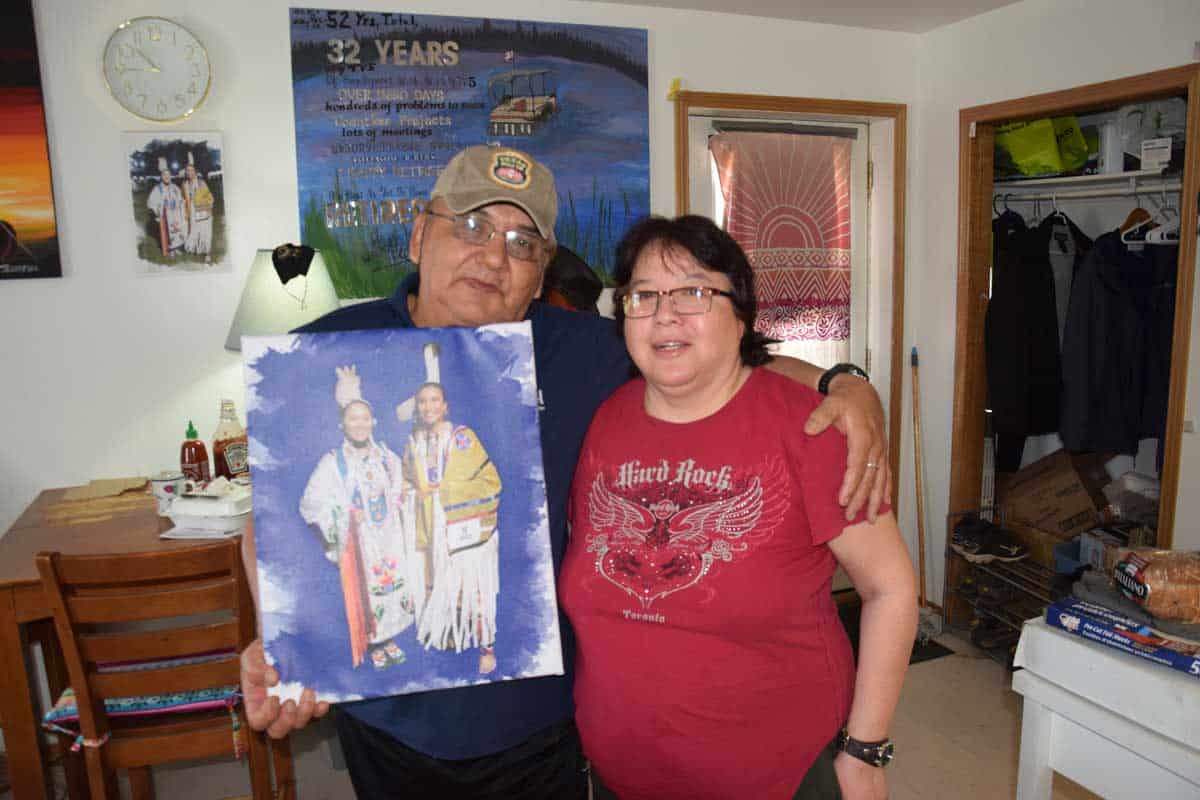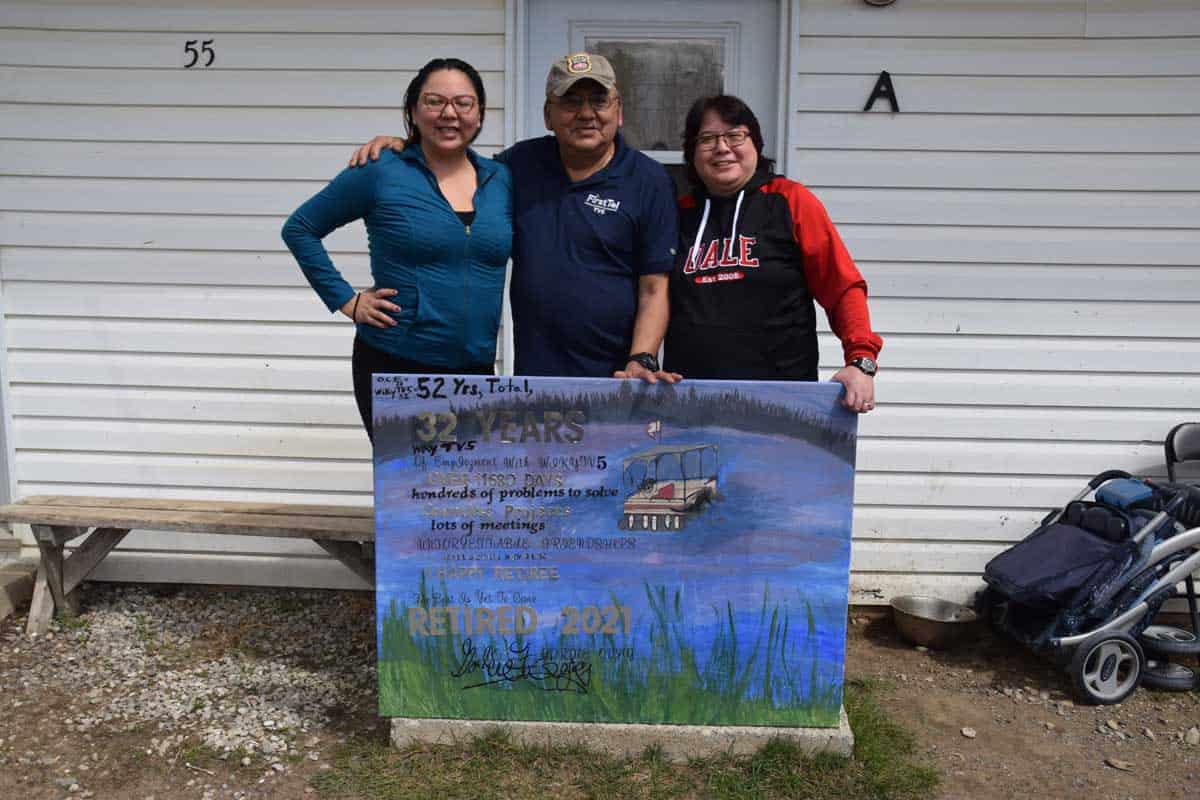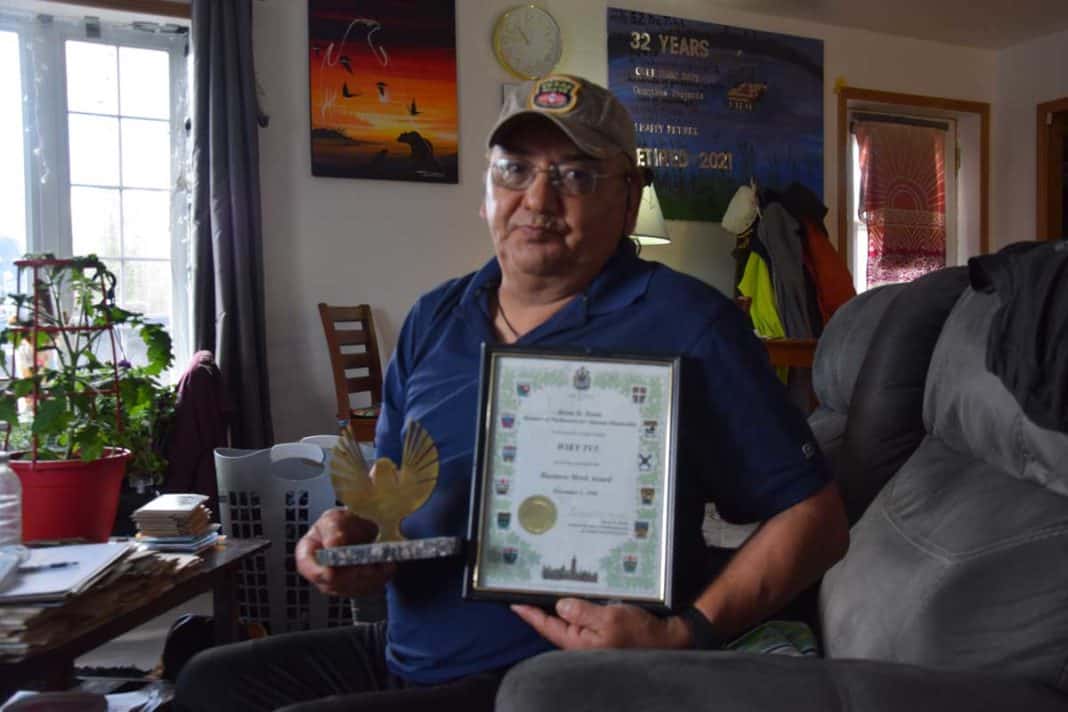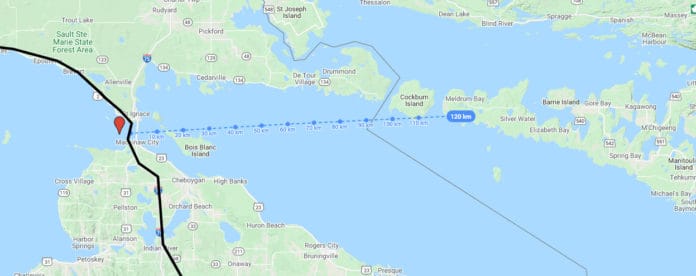Gordie Odjig has chronicled his community for 33 years
WIIKWEMKOONG—For 32 years, Gordie Odjig of Wiikwemkoong has been dutifully recording community events big and small in the Wiikwemkoong Unceded Territories, amassing a huge audio-visual archive that is now stored on the shelves of the Wikwemikong Heritage Organization.
The Expositor connected with Mr. Odjig this past week to chat about his years of experience, both at the community cable television station and in promoting and strengthening Anishinaabe culture, and how that gig soon morphed into a passion that would consume his working life.
Spread out across Mr. Odjig’s living room floor, coffee table and just about every flat surface within sight of the camera, were memories of a lifetime of service to the community, most rescued from his home that was recently destroyed by a flood. The apartment on Potawatomi Street he shares with his wife Leanne is a temporary accommodation as he rebuilds his home. Ms. Mishibinijima quietly folds the family laundry before heading off to work, she has a couple of years yet before she can join Mr. Odjig in retirement. She smiles good-naturedly when asked what she thinks about the piles of photographs, tapes and trophies that have taken over her living room and shakes her head. “That’s Gordie,” she laughs.
Hanging near the door is a huge painting celebrating his career, a gift from a co-worker.
“That big retirement masterpiece painting was done by Racheal Cooper, well her daughter Georgia Cooper, I guess,” he said. “You can see me there on the side of my pontoon boat with my dog.” Mr. Odjig operates Wiky Bay Tours as one of his many side gigs, something he plans to do a lot more of now that he has more free time. He is also creating a system of ATV trails through the property where he has operated his micro tourist resort for many years.
As we chat, son Dylan wanders in to grab a bite of breakfast before disappearing back into his bedroom. A little while later, daughter Tashina stops in on her way to camp, dropping off a sewing serger on the kitchen table. Mr. Odjig explains his daughter is a fashion designer when she isn’t working at her full-time gig as an executive assistant. Seems the Odjig family members didn’t fall far from the tree.

The rest of the immediate Odjig clan includes stepson Jamie Mishibinijima, grandsons Michael, Nookmic and Declan and granddaughter Montana Manitowabi.
Having been forewarned of the impending interview, Mr. Odjig has jotted down some notes, a storyboard of sorts so he doesn’t forget any important waypoints in his career.
“When I was a kid, I was always in the bush, me, my brothers and my friends we were doing all kinds of things outside. I loved adventure, we were always doing things like making rafts, kinda like Huckleberry Finn,” he said.
“When I went to school, maybe Kindergarten or Grade 1, somebody was filming in the hallway,” he said. “I looked into the eyepiece of the camera and moved it around. I thought to myself ‘that was amazing.’ Boom. I was hooked. That’s what I want to do. Ever since then I have been exploring that camera thing.”
“Whenever there was a Christmas concert or something and they wanted someone to run the video camera I would put my hand up right away and say ‘I’ll do it, I’ll do it.’ I always loved video cameras and taking those pictures. Those pictures remain behind for years after the event.”
“While we were playing one day, me and my brother Stan heard this banging sound coming from the old arena.”
Sneaking down to the arena, the group of inquisitive children wormed their way beneath the walls and under the bleachers.
“There were these guys, dressed up like ‘Indians’ and they were practicing dancing and banging on a drum,” he recalled. Captivated by the amazing sight, he ran home to tell his mother what he had seen.
What he had seen was a group of powwow performers who had come to Wiikwemkoong from Western Canada for the first Wikwemikong Powwow. “We didn’t have powwows in those days, well, there were some things but they were all hidden away, kept underground because it wasn’t allowed,” he said.
“Back in those days I lived on the reserve and me and my little buddies didn’t know much about the world outside,” he laughed. “I told my mom that I saw a bunch of wild Indians dancing and drumming in the arena and how I wanted to be an Indian when I grew up to dance too.”
His mother laughed and gently told him he already was, speaking in Anishnaabemowin. “See, we didn’t have any idea back then,” he laughed. “Everyone around us was the same, we didn’t even know we were Indian.”
Before the advent of the Wiikwemkoong High School, students from Wiikwemkoong would travel to West Bay (M’Chigeeng) to attend Manitoulin Secondary School. “It was culture shock,” he said. “You discovered all these other kids, white kids, from all over the Island. I made a lot of friends, folks from Tehkummah, Mindemoya, Kagawong and Gore Bay. A lot of those guys I am still friends with.”
There Mr. Odjig discovered the audio-visual room in the library and his first mentor, Ken Drysdale and a world of technological marvels opened up for him. “I used to look at his black and white stuff,” he said. “When I finished high school, that’s when I started playing hockey with the Wiky T-Birds. I was the youngest guy, they didn’t want to play because they thought I would get hurt. My brother (the late) Scotty Odjig was the coach. That was the good old days.”
The world of video helped Mr. Odjig deal with the culture shock while he was at high school.

His first job was working construction, wheedling his way into a job helping to build the Wiky Thunderdome (arena).
“It was around then, 1973, when I joined the Wiky Drum Committee, that’s when I first really got into my culture,” he said. It was the beginning of the fulfillment of that childhood dream as the group travelled across the province singing and dancing.
But the siren call of audio-visual remained and he decided to attend Cambrian College. Although he was taking his own photographs and developing them, “I didn’t like the chemicals, so I decided to go the video route,” he said.
It was after his first year of college that he got a call from Ojibwe Cultural Foundation (OCF) founder Marylou Fox. “She said ‘we really need you here’,” he recalled. “I needed the money, so I said ‘okay.’ That’s when I started working at OCF.”
Although he was technically employed as an audio-visual technician, Ms. Fox knew of his experience as an Anishinaabe singer and dancer and quickly corralled him into a dual role.
“When the (tourist) bus would come in, she would ask me, ‘Gordie, would you talk to these people about the culture?’” he said. “After I finished talking to them, I would run over to start the slide show. Then I would be videotaping the whole thing. I had three jobs on the go.”
He learned more and more about videotaping and his culture. “There was never a dull moment,” he said. “Everything was interesting.”
One day another call came, this time from then Wiikwemkoong Ogimaa Al Shawana. “The cable company had come in by then and he told me that there was a community channel and could I come and start something up,” said Mr. Odjig. That was the birth of what would soon become known as WIKY TV5. “I would film all kinds of events going on in the community and put them on the television, sometimes I would just loop them so they could play over and over for people to be able to see them whenever they got home.”
For a couple of years, Mr. Odjig scampered back and forth between his three jobs at the OCF and the new gig at WIKY TV5.
Shortly after that, he got married for the first time and began Wiky Bay Tours and his bed and breakfast. He began clearing trails. “I even had a driving range at one time,” he said. “I did all these things, but it wasn’t so much that I wanted to, the ideas just kept coming to me.”
Mr. Odjig has copies of many of the important events he filmed through his career, including early Little NHL games, tapes of singing by his relatives at powwows through the years and a host of certificates and trophies garnered over a lifetime of service.
He holds up a tape before placing it in a recorder and playing a small piece. The label reads “Two Ojibwe ladies talking.”
“That’s my auntie and her friend talking,” he said. “It’s a mix of Odawa and Potawatomi. The old language. There are words they use you just don’t hear people using anymore. That helps me with my language,” he said. There are recordings of his parents and siblings speaking too.
Mr. Odjig stresses that although he has copies of things, the originals remain in the custody of the Wikwemikong Development Corporation (WDC), the parent of FirstTel and Wiky TV5.
One of the things he likes to do is use some of those words that those tapes refresh in his vocabulary around some of his buddies in the community who speak Anishnaabemowin. “They say, ‘holla, I haven’t heard that word in a long time,” he laughs. “It helps keep those words alive.”
Keeping the culture alive and vibrant has been a lifelong passion for Mr. Odjig, who has taught hoop dancing (his niece Lisa became world champion) and other dances as well as passing on songs.
He laments the loss of many of the dances he saw as a child and hopes that some of those dances will come back into fashion.
Mr. Odjig said that he was very grateful for “all the people of Wikwemikong, WDC, Wiky band for 32 years of service and for my 18 years at the OCF, totaling 52 years of audio-visual service, great friendships and memories l hold dear to my heart. To all my families, especially to my new wife Leanne Mish-Odjig for believing in me. I really appreciate everybody—chi-miigwetch.”
The remnants of a celebratory cake bearing Mr. Odjig’s likeness (courtesy of Christianna Jone’s daughter Georgia Cooper) rests on the kitchen counter and the large painting stands sentinel beside the apartment door as reminders both near and long-term as Mr. Odjig prepares to embark on a whole new set of adventures.
“I’m ‘semi-retired’,” he laughed. “I have so many things I want to do. I have always been like that, I can’t stay still.”
Going forward, Mr. Odjig will continue his role as a consummate storyteller as he takes folks out on his tour boat.
“I hope things get better soon,” he said. “We observe all of the protocols on the boat, even though we are out in the fresh air, everyone wears a mask and we sterilize everything.”
“But first I have to get this sorted out,” he laughs, surveying the living room. Ms. Odjig smiles.





